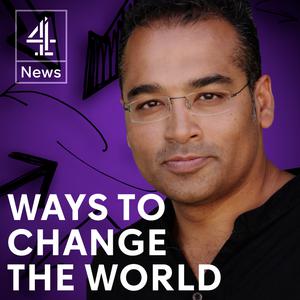
Ways to Change the World with Krishnan Guru-Murthy
Channel 4 News
A Channel 4 News podcast with Krishnan Guru-Murthy
- 35 minutes 27 secondsBlur's Alex James: rock stars either die or end up on a farm
On this week’s episode of Ways to Change the World, Blur bassist Alex James speaks to Krishnan Guru-Murthy about Jeremy Clarkson, Oasis, band break ups, diets, and how he went from a rock and roll star “swinging from chandeliers” to a farmer with five kids.
Alex James’ new book Over The Rainbow tells the story of Blur’s reunion tour last year and the struggles of a middle aged man to fit in the jeans he last wore as a young rock star.
Produced by Silvia Maresca.
18 December 2024, 5:41 pm - 37 minutes 36 secondsOmid Djalili: Finding Humanity Through Comedy, from 9/11 to the Middle East wars
Comedian Omid Djalili talks to Krishnan Guru-Murthy about Syria, Israel, Gaza and the Iranian regime, and why the West should care about the Middle East.
In this episode of Ways to Change the World, Djalili says a combination of his Baha’i faith, his heritage and the encouragement of friends is what has kept him resilient in the face of setbacks, including being “cancelled” after the 9/11 attacks.
Produced by Silvia Maresca
11 December 2024, 3:26 pm - 43 minutes 41 secondsTim Minchin on his viral speech, quitting social media and being kind
Tim Minchin has never been one for following the rules—or even having a dream. “I ran towards unpigeonholeability,” he tells Krishnan Guru-Murthy, reflecting on his career as a comedian, musician, and writer who refuses to fit into a single box.
Best known for his sharp wit, powerful lyrics, and smash-hit musical Matilda, Minchin explains why he doesn’t see comedy as a vehicle for his worldview and how the messiness of life fuels his creativity.
In this episode of Ways to Change the World, he opens up about stepping away from social media, the rise of polemicists in public discourse, and why kindness and generosity are central to the stories he wants to tell, and the kind of person he wants to be.
Produced by Shaheen Sattar, Silvia Maresca and Ka Yee Mak.
4 December 2024, 5:00 pm - 33 minutes 41 secondsBrianna Ghey’s mother on dangers of the internet and banning social media for under-16s
Esther Ghey is the mother of Brianna Ghey, the 16-year-old transgender girl who was stabbed to death in a park in Cheshire, England in 2023.
In the wake of her daughter’s brutal murder, Esther has been campaigning to ensure that Brianna’s legacy is an improvement in the mental health of children and teenagers, something she believes can be achieved by limiting their access to harmful online content from an early age, as well as with teaching mindfulness in schools.
In this episode of Ways to Change the World, she tells Krishnan Guru-Murthy why protecting young people online is not only the parents’ responsibility, but that of governments and social media companies. She also talks about the importance of teaching empathy and compassion to children, and why she supports Labour MP Josh MacAlister’s proposal of banning social media apps for under-16s in the UK.
Produced by Silvia Maresca.
20 November 2024, 6:29 pm - 33 minutes 53 secondsEconomist Torsten Bell MP explains how to fix Britain
Economist-turned-Labour MP Torsten Bell knows all too well that things have not been going great for Britain - but is optimistic that a different future is possible.
The UK’s economy has been making the headlines for all the wrong reasons in the last few years: wages are flatlining, taxes are on the rise, and public services are on the brink of collapse. The younger generation can’t afford to buy a home, the old aren’t receiving the social care they need and an increasing number of people are reliant on food banks. So what’s at the root of all these problems - and crucially, how do you fix it?
In this episode of Ways to Change the World, Torsten Bell, the Labour politician and former Chief Executive of the Resolution Foundation, talks to Krishnan Guru Murthy about Britain’s “catch up potential” to turn things around and build a more equal and better off country.
Produced by Silvia Maresca.
20 September 2024, 12:00 am - 42 minutes 15 secondsNate Silver on Trump-Harris election, Elon Musk and AI
American political forecaster Nate Silver explains who will win the US election between Kamala Harris and Donald Trump, why he thinks Elon Musk’s comments during the riots in the UK were acceptable, and how AI will change the world.
Silver is the founder of the influential polling and politics website FiveThirtyEight, but now writes on his website Silver Bulletin. He’s just published a new book called ‘On the Edge: The Art of Risking Everything’ where he argues that “professional risk takers” such as low-stakes poker players, crypto kings, venture-capital billionaires and hedge fund managers are “winning” in American society, and what they can teach us about handling the uncertainties of the 21st century.
In this episode of Ways to Change the World, American election forecaster, Nate Silver, tells Krishnan Guru-Murthy the chances of Kamala Harris or Donald Trump winning the US election, why he thinks Elon Musk’s tweets on X during the 2024 UK summer riots were part and parcel of having freedom of speech, and the transformative impact of AI on the world.
Produced by Silvia Maresca.
3 September 2024, 4:49 pm - 25 minutes 7 secondsUS Presidential candidate Cornel West on Israel Hamas war, greedy ruling class and Biden vs Trump
US Presidential candidate Dr Cornel West is a philosopher and prominent advocate for social and racial justice. He’s taught at some of the top universities in the US including Harvard, Yale, and Princeton, but has one major plan if he becomes President: to “dismantle the American empire”.
The 71-year-old activist, who campaigned for Biden in 2020, has recently been vocal against both the Democratic and Republican’s party’s stance on Gaza, which he calls “morally bankrupt”. Though he faces very long odds in winning the race, he says he wants to appeal to a group of disillusioned voters who have given up on the American two-party system.
In this episode of Ways to Change the World, Dr Cornel West tells Krishnan Guru-Murthy why he thinks US foreign policy on Israel is enabling destruction in Gaza, how both Biden and Trump are problematic for oppressed groups, and why it’s difficult to have hope to change the world without also being in despair at the suffering we see.
Produced by Silvia Maresca
10 May 2024, 9:00 am - 29 minutes 29 secondsEconomist Joseph Stiglitz on Pro-Palestine campus protests, Trump and rethinking freedom
Nobel Prize Laureate Joseph Stiglitz is one of the most influential economists in the world, having advised multiple Democratic Presidents of the US and the World Bank, where he worked as Chief Economist and senior Vice President. His latest book, called “The Road to Freedom: Economics and the Good Society,” argues that the economic right’s concept of “freedom” doesn’t take into account the necessary trade-offs, that one person’s freedom often comes at the expense of another’s. And that “free” - unregulated - markets, far from promoting growth and enterprise, in fact lessen economic opportunities for majorities and syphon wealth from the many to the few. Stiglitz, now 81, is a Professor at Columbia University in New York, where freedom of speech and the right to protest have been making headlines in recent weeks, with hundreds of pro-Palestinian student protesters occupying the campus and clashing with police. The movement has now spread from the US, and encampments around the world are being launched, where the common demand is asking universities to divest and disclose their financial support of the war in Gaza. In this episode of Ways to Change the World, economist Joseph Stiglitz tells Krishnan Guru-Murthy why more government intervention is desirable, whether campus protests in the US are going “over the line” and why stalling living standards “create a fertile field” for demagogues like Donald Trump. Produced by Shaheen Sattar and Silvia Maresca
7 May 2024, 4:24 pm - 31 minutes 34 secondsComedian Bassem Youssef on the Israel-Gaza war, the Arab Spring, and why we can’t change the world
Bassem Youssef thinks that he’s come on the wrong podcast. “People in power don't really care about any of our suggestions to change the world”, he tells Krishnan Guru-Murthy, “because if our ways to change the world affect their interests, they will stop you.”
And he knows what he’s talking about, having fled his home country of Egypt after his TV comedy became no longer acceptable to the authorities there.
Bassem started his career as a heart surgeon, then moved to political comedy in response to the 2011 Egyptian Revolution, taking on the ruling elite in his country. His political satire show, ‘Al-Bernameg’ was the most watched show in Egyptian TV history, but soon became a thorn in the side of the authorities there, forcing him into exile.
In this episode of Ways to Change the World, Bassem Youssef talks about his view that Israel should be held accountable for the war in Gaza, how the Egyptian revolution was a turning point in his life, and why he feels disillusioned with the West's "lecturing" on human rights and international law.
Produced by Shaheen Sattar, Silvia Maresca and Hila May.
11 April 2024, 9:36 am - 33 minutes 49 secondsPlaywright of Jodie Comer's Broadway hit, Suzie Miller, on sexual assault and getting justice
When lawyer turned playwright Suzie Miller created a one-woman show starring Jodie Comer for the West End and Broadway called ‘Prima Facie’, she wouldn’t have dreamt that her play would fuel real change in the legal system’s approach to sexual assault cases.
The play has won multiple awards, has inspired efforts to change UK laws, and has also been turned into a book of the same title.
In this episode of Ways to Change the World, Suzie Miller tells Krishnan Guru-Murthy why rape victims are failed by the legal system, how trauma is misunderstood in the court room, and why a patriarchical system forces female barristers to become part of the problem.
Produced by Silvia Maresca and Shaheen Sattar.
WARNING: Contains references of sexual assault
4 April 2024, 3:08 pm - 28 minutes 52 secondsPoet Nikki Giovanni on white supremacy, the Capitol attack, and teaching the Virginia Tech shooter
Nikki Giovanni has spent more than five decades in the public eye, as an activist, poet and innovator.
Born on the "wrong side of the tracks" in Knoxville, Tennessee, during the era of segregation, Giovanni came of age during the Black power and civil rights movements in 1960s in America. She came under the spotlight again in 2007, when the university she had been teaching at, Virginia Tech, was the victim of a mass shooting, carried out by one of her former students. The poem she wrote to commemorate the 32 victims, “We are Virginia Tech”, touched many people across the world.
In this episode of Ways to Change the World, Nikki Giovanni joins Krishnan Guru-Murthy to to talk about her life and work, how anger has fuelled her poetry at different stages of her life - touching on topics such as domestic abuse, segregation, Black Lives Matter and Donald Trump - and recounts her experience of the 2007 Virginia Tech massacre.
Produced by Silvia Maresca.
28 March 2024, 6:53 pm - More Episodes? Get the App
Your feedback is valuable to us. Should you encounter any bugs, glitches, lack of functionality or other problems, please email us on [email protected] or join Moon.FM Telegram Group where you can talk directly to the dev team who are happy to answer any queries.
 Political Thinking with Nick Robinson
Political Thinking with Nick Robinson
 Reasons to be Cheerful with Ed Miliband & Geoff Lloyd
Reasons to be Cheerful with Ed Miliband & Geoff Lloyd
 Today in Focus
Today in Focus
 Full Disclosure with James O'Brien
Full Disclosure with James O'Brien
 Americast
Americast
 The Owen Jones Podcast
The Owen Jones Podcast